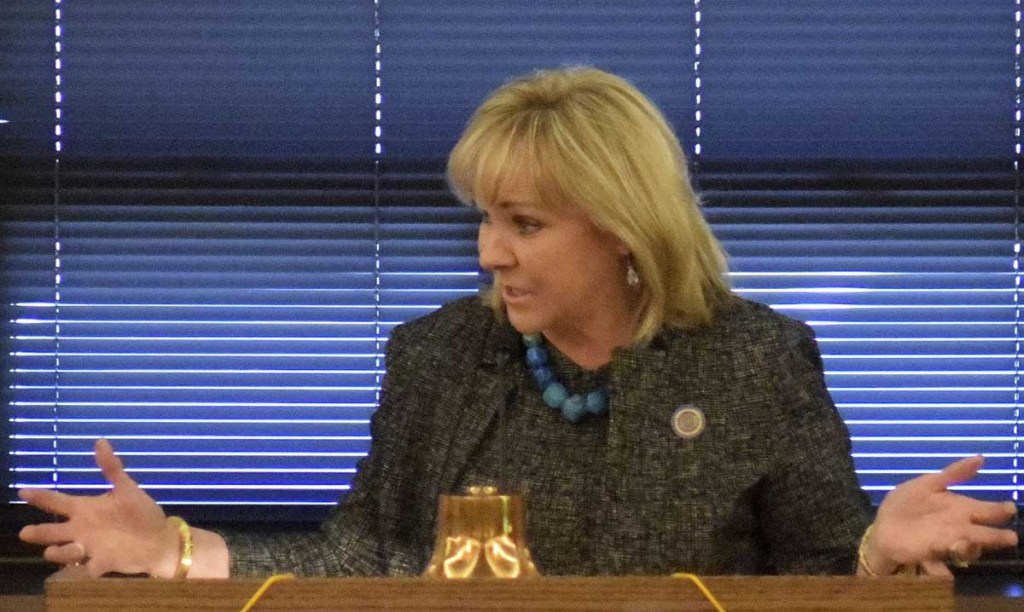Oklahoma law extends self-defense rights to churches
Published 5:22 pm Tuesday, May 8, 2018

- Mary Fallin
OKLAHOMA CITY — Despite concerns that it could actually weaken gun rights, Gov. Mary Fallin has signed a measure to protect Oklahomans who use deadly force to protect themselves at places of worship.
Starting in November, new criminal and civil protections will go into effect if it’s necessary to shoot, beat or use other deadly force to stop someone committing a dangerous felony at places of worship, said Don Spencer, president of the Oklahoma Second Amendment Association.
Trending
Oklahomans have long been permitted to use deadly force to defend themselves inside their homes and businesses without fear of criminal and civil prosecution under the state’s so-called Castle Doctrine. Now, the Legislature has expressly extended those protections to worshippers, he said.
The measure, which provides the ability to “stand your ground,” is also designed to give churches, synagogues, temples and mosques immunity if a defender accidentally shoots or injures a bystander, Spencer said.
“We consider this a proactive bill and not a reactive bill,” Spencer said. “Its intention is to take away all of those kinds of frivolous lawsuits.”
In November 2017, 26 people were killed and 20 injured while worshipping at a Baptist church in Sutherland Springs, Texas. As the 26-year-old gunman fled, an armed resident confronted him and shot him with a rifle.
That shooting is among at least 14 that have occurred at places of worship across the country since 2012, according to an Associated Press analysis.
“We have laws that allow people to use deadly force if they feel like they are in danger in their homes and businesses,” Fallin said Tuesday. “House Bill 2632 is about protecting people in their place of worship.”
State Rep. Cory Williams, D-Stillwater, who opposed the legislation, said Oklahomans already have an inherent right to self-defense. While the measure appears great on the surface, he said it was poorly written and won’t actually do anything to benefit the state.
He said he fears it will ultimately harm gun rights in the state.
“By doing something like this, you actually muddy the water,” he said. “We’re actually inadvertently limiting the Second Amendment. If you go through and start carving out places where you can specifically use a firearm for self-defense, you’re automatically precluding other places.”
Oklahoma’s measure, meanwhile, will still allows places of worship to decide if they want their congregants armed with more than just tithes.
Brett Farley, executive director of the Catholic Conference of Oklahoma, the public policy arm of the Oklahoma’s Catholic Church, said guns generally are forbidden at Catholic churches. Most dioceses have a preset policy, but priests have individual purview.
Many larger Catholic parishes now hire security guards or off-duty police officers to provide an armed presence rather than relying on parishioners, he said.
Farley said his organization has some reservations about the legislation.
“We are concerned in particular (about) a blanket removal of liability for citizens who end up in a situation where gunfire is exchanged in which unintended consequences result in regard to innocent individuals who may be injured or killed as a result of gunfire,” Farley said. “We would hope there would be more incentive for training for citizens who choose to carry.”
And while the law intends to shield places of worship from liability, Farley is not certain the law will actually do that.
“I would say that we think it’s acceptable to encourage people to defend themselves…. (but) we think the Second Amendment needs to be applied wisely, and it remains to be seen if this particular language is the correct approach,” he said.
Stecklein is state reporter for Oklahoma CNHI News Service publication newspapers. Contact her at jstecklein@cnhi.com.


